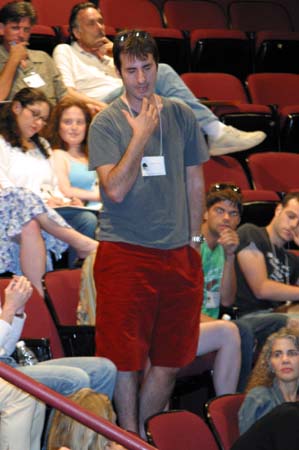
Jon Robin Baitz's Play "Three Hotels": Kenneth, a former Peace Corps volunteer gone astray, works for a cutthroat company that is eating its way through the world under the misleadingly harmless name of Iris and Rose
Three Hotels -- Centerstage
Corporate brainwashing run amok - - - - - - - - - - - - Meagan Boltwood (buzz@boulderweekly.com)
He takes the stage with the confidence of a man who knows how to get to the top. He's got the look, the facial expressions and the lingo. He's even changed his name to suit his agenda. It's all very American, especially when the facade sinks and a self-conscious shadow of a man rises to the surface.
It's not a challenge to like Kenneth Hoyle (Paul Page). His anecdotes about climbing the ladder of so-called success are all charmingly humorous. Even his techniques for firing his co-workers are told in such a down-to-earth manner that it is difficult to grasp the horror that fills his days.
Three Hotels, written by Jon Robin Baitz and directed by Terry Dodd, takes place in (you guessed it) three hotels spread over the globe. The transitional atmosphere creates a changing background that supports the unaccountability of its characters. As long as the business travelers keep moving, they will never have to face the repercussions of their actions.
It's a play that shows the agony and conflict surrounding the awkward switch from the '60s flowery idealism to the dog-eat-dog realism of the '90s. The struggles of a husband and wife explore the breakdown of boundaries in a way that is both powerful and complete, despite the play's brevity.
Kenneth, a former Peace Corps volunteer gone astray, works for a cutthroat company that is eating its way through the world under the misleadingly harmless name of Iris and Rose. The company dresses up its salespeople as nurses and doctors to push baby formula into the Third World. The ethics of selling fake milk to women who don't have access to clean drinking water are questionable to say the least and have sparked more than one activist demonstration.
After the audience is enraptured with Kenneth's good ol' boy antics, the reality of his business comes into view. His job is to mislead the masses and funnel their meager income into the deadly formula. The photos of the bloated bellied children don't bother him, or so he says. He's more concerned about the office politics that may one day destroy him.
The second act, titled "Be Careful," contains Barbara Hoyle's (Deborah Persoff) side of the story. As the wife of a man who personifies colonialism, she's seen it all and has paid the price-with the loss of her 16-year-old son Brandon, among other things. Her voice is surprisingly steady through her monologue, though it's hard to miss the obvious traces of the suffering from which she can not escape. She is openly opposed to the work of her husband and his company but has faithfully carried her disapprovals across the Earth.
But this is more than a commentary about a dutiful wife and a changed husband. It is a plea for conscious living and a commitment to preserving justice.
Kenneth is no fool, and he is certainly not the monster we need to create to justify evil. He is a hardworking American, running as fast as he can on the hamster wheel. He admits to never liking the product. He even understands the force behind unethical business practices. "Most people," he says, "don't think that other people are actually real." This perception allows him to do anything to anyone, despite the harm he causes.
Like most illusions, Kenneth's commitment to imposing baby food on the world's malnourished comes to an end. He is left alone with his worst fears in a hotel room on the Day of the Dead. Surrounded by families who are celebrating their dead by offering elaborate meals, Kenneth's words soften and space themselves out in an attempt to connect the inexcusable events of his life. The confidence that once shielded him from doom has been replaced by a silence that we can only hope will lead him back to himself and to his wife. Go see this play.

